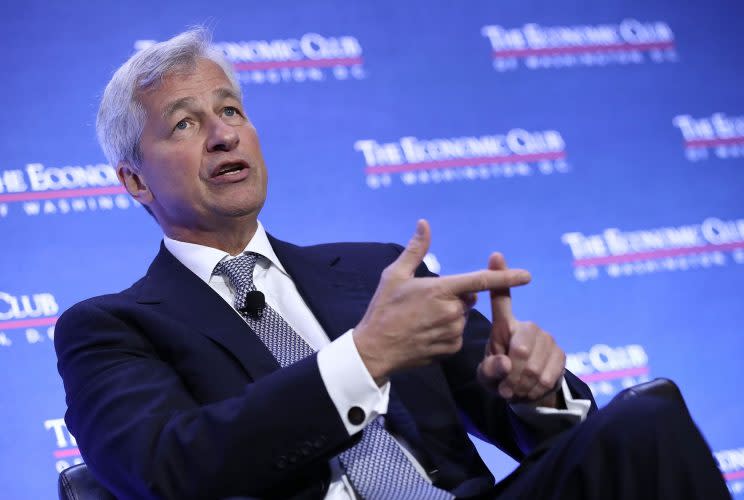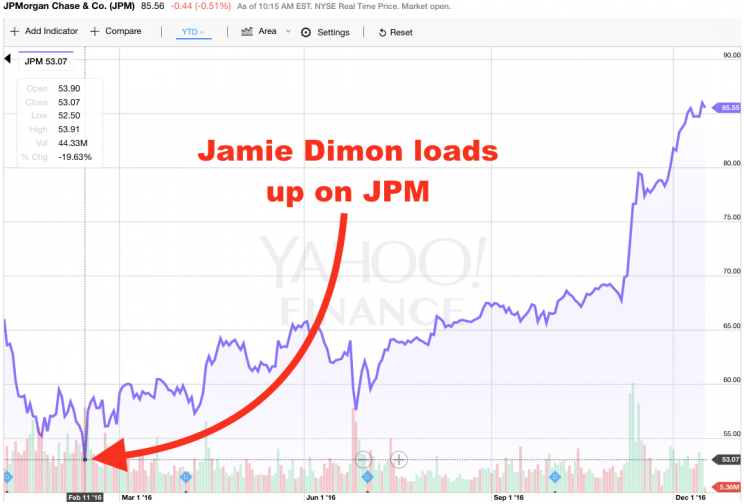TRADE OF THE YEAR: Jamie Dimon loaded up on JPM at the perfect time
Historically, the most legendary trades in the market are made by hedge fund managers like John Paulson or big institutional portfolio managers like Bill Miller.
But 2016’s greatest trade was made by a bank CEO: JPMorgan Chase’s Jamie Dimon.
On February 11, it was revealed that Dimon dropped $26.6 million of his own money on 500,000 shares of the bank’s stock.

At the time, that sum was similar to the worth of his entire compensation package for 2015, which amounted to a $1.5 million salary, a $5 million cash bonus, and $20.5 million in performance share units.
Since that time, shares of JPMorgan have rallied nearly 55%. Dimon has made more than $15.2 million on his stake.
A representative from JPMorgan declined to comment.

Across the board, financial stocks had been pummeled in the first six weeks of 2016. Lately, financial stocks, including Goldman Sachs (GS), Bank of America (BAC), JPMorgan (JPM), Morgan Stanley (MS), and Citigroup (C), have been on a tear in the wake of the election.
Year to-date, Dimon has seen his net-worth grow by 23.3%, or $237.6 million, to $1.3 billion, according to data compiled by Bloomberg. Most of that gain came post-election. Dimon isn’t the only one seeing gains.
Goldman Sachs CEO Lloyd Blankfein saw his net-worth grow by 18.7%, or $187.6 million, bringing his net worth to $1.2 billion, the Bloomberg data shows. Citigroup CEO Mike Corbat’s shares in the bank have rallied, giving him a position valued at just over $30.8 million, while Bank of America’s CEO Brian Moynihan’s $1.1 million shares were last worth $25.58 million, data from Bloomberg shows.
The election was a “grand slam” for the banks
Donald Trump’s victory alongside the Republicans sweeping the House and Senate has been seen as a “grand slam” for financials. The story with the banks, though, isn’t just about the election, according to bank analyst Dick Bove of Rafferty Capital Markets.
Going back to 2015, there was a huge fear that the bust in oil prices was going to create a problem for banking similar to what mortgages did during the crisis.
“This was obviously a ridiculous farce,” Bove told Yahoo Finance, noting that energy loans represented a tiny part of the banks’ loan portfolios compared to mortgages.
“So they lacked the ability to do what mortgages did. The point is people believed it. They pounded the bank stocks into dust, pushing them down by February of this year to an extraordinary low point.”
In 2015, the banking industry produced the biggest profit in its history, Bove noted. Once earnings results came out in January, people began to discover that the hit in the form of energy was not that big.
“The rally in bank stocks did not start with the election by a long shot,” he said. “What caused this thing to occur was in February when people began realizing that oil did not exert the pressure that people assumed would occur.”
According to the KBW Nasdaq Bank Index (^BKX), bank stocks bottomed out on February 11, 2016 at $55.99. That index was last trading at $99.29.
“They’re dirt cheap still,” Bove said.
Right now, there’s a confluence of things favoring the bank stocks.
“I wish I could come up with a phrase that is opposite of a perfect storm,” he said.
The most important element in bank earnings is not interest rates, but loan volume, he said. Bove expects loan volume to be up 6% to 8% in 2017.
“The Trump program, which is for lower corporate taxes, a little tariffs, maybe stimulus, maybe a big bunch or repatriated dollars, and you apply it to banking, forgetting everything else, you first become aware that there’s going to be a big increase in lending because someone’s got to come up with money to build bridges and tunnels … Think about manufacturing, someone has to come up with money to fund inventories and facilities. And since all these people seem to be working, there will be massive amounts of credit card loans.”
Advances in technology are also favorable for the banks because it lowers the costs of running them.
As for banking and deal activity, Bove also expects more IPOs to hit the market and that there will be more mergers-and-acquisitions. He expects trading will benefit because of the instability in the currency markets and the need to rebalance balance sheets.
“All these things are coming together in the most perfect possible way for the banking industry. It’s not like the rest of the market, not overvalued. I just can’t imagine a better time to buy bank stocks.”
—
Julia La Roche is a finance reporter at Yahoo Finance.
Read more:

 Yahoo Finance
Yahoo Finance 